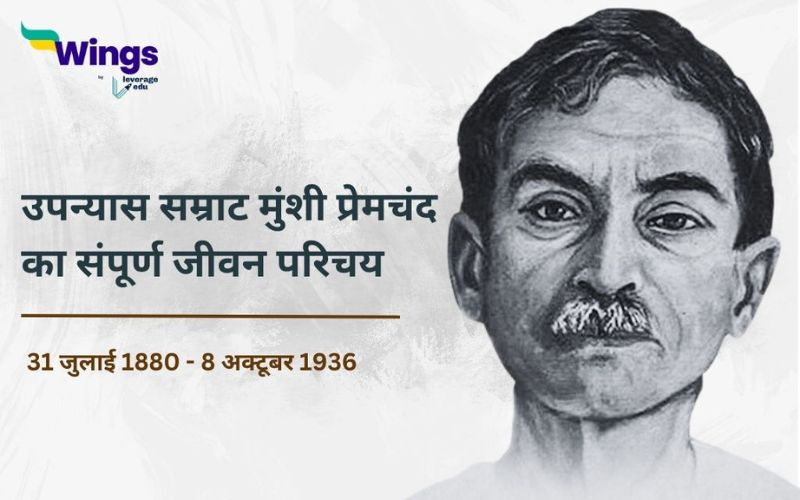Munshi Premchand, born as Dhanpat Rai Srivastava, was one of the most prominent and influential Hindi writers of the 20th century. Often referred to as the “Godfather of Hindi literature,” Premchand’s literary works have had a lasting impact on the Indian literary landscape. His novels, short stories, and plays have captivated readers for generations, and his legacy continues to inspire writers and scholars alike.
In this comprehensive biography, we will delve into the life and times of Munshi Premchand, exploring his early life, literary career, major works, and the profound influence he had on Hindi literature. Join us as we uncover the fascinating story of this literary giant and his enduring contribution to the world of Hindi literature.
Early Life and Education of Munshi Premchand
Munshi Premchand was born on July 31, 1880, in the village of Lamahi, near Varanasi, in the state of Uttar Pradesh, India. His birth name was Dhanpat Rai Srivastava, and he was the son of Ajaib Lal Srivastava, a postal clerk, and Anandi Devi.
Premchand’s early life was marked by hardship and adversity. His family struggled with financial difficulties, and he lost his mother at a young age. Despite these challenges, he was determined to pursue his education and become a writer.
After completing his primary education, Premchand enrolled at the Queen’s College in Varanasi, where he studied Persian and Urdu. He later went on to study law at the Allahabad University, but he never practiced law, instead choosing to focus on his literary pursuits.
Munshi Premchand’s Literary Career
Premchand’s literary career began in the early 1900s, when he started writing short stories and articles for various Hindi and Urdu publications. His first short story, “Duniya Ka Sabse Anmol Ratan,” was published in 1907, and it was the beginning of a prolific and successful writing career.
Over the next few decades, Premchand continued to write extensively, producing a vast body of work that included novels, short stories, and plays. Some of his most famous works include:
- Novels:
- “Godan” (The Gift of a Cow)
- “Karmabhoomi” (The Land of Karma)
- “Gaban” (The Theft)
- “Nirmala”
- Short Story Collections:
- “Mansarovar”
- “Kafan” (The Shroud)
- “Poos Ki Raat” (A Night in Poos)
- “Manohar Kahaniyan”
- Plays:
- “Karbala”
- “Ashok”
- “Kashmakash”
Premchand’s writing was deeply rooted in the social and political realities of his time, and he often used his literary works to address issues of poverty, social injustice, and the plight of the common people. His writing style was characterized by a keen observation of human nature, a deep understanding of the human condition, and a strong sense of moral purpose.
Munshi Premchand’s Writing Style and Themes
Premchand’s writing style was renowned for its simplicity, realism, and emotional depth. He had a remarkable ability to capture the nuances of everyday life and to portray the complexities of the human experience with empathy and compassion.
One of the defining features of Premchand’s writing was his commitment to social realism. He often wrote about the struggles of the poor and the marginalized, and his works were imbued with a strong sense of social consciousness. His novels and short stories frequently explored themes of poverty, oppression, and the need for social reform.
Another key aspect of Premchand’s writing was his deep understanding of human nature. He had a keen eye for the subtle complexities of human behavior and emotions, and he was able to create richly drawn characters that resonated with readers. His works often explored the inner lives of his protagonists, delving into their hopes, fears, and the moral dilemmas they faced.
Premchand’s writing also reflected his strong moral and ethical principles. He believed that literature should serve a higher purpose, and he used his works to promote values such as honesty, integrity, and social justice. His writing was imbued with a sense of moral purpose, and he often used his stories to challenge the status quo and advocate for social change.
Impact and Legacy of Munshi Premchand’s Work
Munshi Premchand’s literary works have had a profound and lasting impact on Hindi literature and Indian culture. He is widely regarded as one of the most influential and important writers in the history of Hindi literature, and his works have been translated into numerous languages, including English, French, and Russian.
Premchand’s influence can be seen in the works of many contemporary Hindi writers, who have been inspired by his commitment to social realism and his powerful storytelling. His novels and short stories have become staples in the curriculum of schools and universities across India, and they continue to be widely read and studied by scholars and literary enthusiasts.
Beyond his literary contributions, Premchand’s life and work have also had a significant impact on the broader social and political landscape of India. His writings were deeply engaged with the social and political issues of his time, and he used his platform as a writer to advocate for social reform and to challenge the status quo.
Today, Munshi Premchand is revered as a literary icon and a cultural hero in India. His works have been adapted into numerous films, television series, and stage productions, and his legacy continues to inspire and captivate audiences around the world.
Munshi Premchand’s Personal Life and Struggles
Munshi Premchand’s personal life was marked by a series of challenges and hardships. Despite his literary success, he faced significant financial difficulties throughout his life, often struggling to make ends meet and support his family.
Premchand’s first marriage, to Shivrani Devi, was an unhappy one, and the couple eventually separated. He later remarried, to Shivarani Devi’s sister, Mehro Begum, with whom he had several children.
In addition to his financial and personal struggles, Premchand also faced significant health issues throughout his life. He suffered from various ailments, including tuberculosis, and his declining health eventually led to his untimely death in 1936 at the age of 56.
Despite these challenges, Premchand remained dedicated to his literary pursuits, and his works continued to be widely acclaimed and celebrated during his lifetime. His unwavering commitment to his craft and his ability to overcome adversity have only added to his enduring legacy as one of the most revered writers in the history of Hindi literature.
Recognition and Awards Received by Munshi Premchand
Munshi Premchand’s literary achievements were widely recognized and celebrated during his lifetime, and he received numerous honors and awards for his contributions to Hindi literature.
In 1935, he was awarded the prestigious Sahitya Akademi Award, the highest literary honor in India, for his novel “Godaan.” This recognition cemented his status as one of the most important and influential writers in the Hindi literary canon.
Premchand was also awarded the Padma Bhushan, one of India’s highest civilian honors, in 1935, in recognition of his outstanding contributions to Hindi literature.
Beyond these prestigious awards, Premchand’s works have also been the subject of numerous scholarly and critical analyses, and his legacy has continued to be celebrated and commemorated long after his passing.
Today, Munshi Premchand is revered as one of the most important and influential writers in the history of Hindi literature, and his works continue to be widely read, studied, and celebrated by readers and scholars alike.
Munshi Premchand’s Contribution to Hindi Literature
Munshi Premchand’s contribution to Hindi literature is truly immeasurable. He is widely regarded as the “Father of Hindi Literature,” and his works have had a profound and lasting impact on the development and evolution of Hindi literature.
Premchand’s literary works are renowned for their realism, social consciousness, and emotional depth. He was a master storyteller who had a keen eye for the complexities of human nature and the social and political realities of his time. His novels, short stories, and plays have become essential reading for anyone interested in understanding the rich and diverse literary tradition of Hindi literature.
Beyond his literary achievements, Premchand also played a crucial role in shaping the language and style of Hindi writing. He was a pioneer in the use of colloquial and conversational Hindi, and his works helped to popularize and legitimize the use of Hindi as a literary language.
Premchand’s influence can be seen in the works of countless contemporary Hindi writers, who have been inspired by his commitment to social realism and his powerful storytelling. His legacy continues to inspire and captivate readers and scholars alike, and his works remain an essential part of the canon of Hindi literature.
Conclusion
Munshi Premchand’s legacy as one of the most influential and important writers in the history of Hindi literature is truly unparalleled. His works have had a profound and lasting impact on the literary landscape of India, and his contributions to the development and evolution of Hindi literature are truly immeasurable.
Through his powerful and socially conscious writings, Premchand has left an indelible mark on the hearts and minds of readers across generations. His novels, short stories, and plays continue to be widely read and studied, and his influence can be seen in the works of countless contemporary Hindi writers.
As we reflect on the life and legacy of Munshi Premchand, it is clear that his impact on Hindi literature and Indian culture as a whole is truly profound. He was a master storyteller, a champion of social justice, and a true literary icon, whose works will continue to inspire and captivate readers for generations to come.
If you’re interested in exploring the life and literary works of Munshi Premchand in greater depth, we encourage you to check out our collection of his most acclaimed novels, short stories, and plays. Discover the power of his storytelling and the enduring relevance of his themes for yourself. Browse our selection now and immerse yourself in the rich literary world of this Hindi literary giant.



